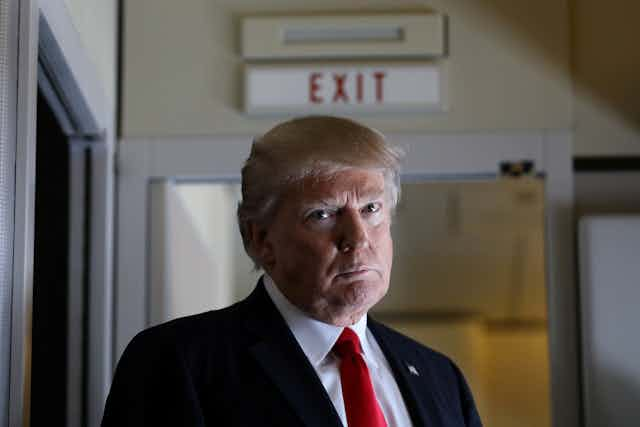When former prime minister Paul Keating said last year it was time to “cut the tag” and loosen the bonds of the Australia’s alliance with the US, who would have thought the man wielding the knife would be Donald Trump?
The public disagreement between the Trump White House and the Turnbull government over the deal to send asylum seekers languishing on Manus Island and Nauru to the US is unprecedented. At no previous time in the history of the Australia-US alliance have things seemed so dire – and got there so quickly.
Past tensions kept quiet
Australian and American leaders over the years have, from time to time, disagreed or said things to cause embarrassment. But for the most part, such disagreements have been kept out of the limelight.
John Howard and Bill Clinton did not like one another. Their discomfort did not, however, seriously affect the alliance. But sometimes discomfort breaks into something stronger.
Blanche D'Alpuget, Bob Hawke’s then-biographer (and later his wife), recounts that Australia’s former foreign minister, Bill Hayden, and US Secretary of State George Shultz loathed one another. Hayden referred to Shultz as “the German pork butcher”, while Shultz called Hayden “stupid” to his face.
But, unlike the current saga, the Hayden-Shultz spat did not become public until after D’Alpuget published her Hawke biography.
In 2008, the content of another phone conversation between Australian and US leaders became public. A brief row broke out when reports emerged of a leaked conversation between Kevin Rudd and George Bush.
As the 2008 financial crisis erupted, Rudd had suggested using the G20 as a way of handling things to Bush in a phone conversation. Bush allegedly replied:
What’s the G20?
The White House angrily rejected the public version of events.
Time to think differently
Members of the US Congress have made a rare intervention in the latest spat in an attempt to counter Trump’s amateurish handling of the issue. Speaker of the House Paul Ryan said:
Australia is a very important and central ally and it’s going to continue to be.
Republican senator Lindsey Graham admonished Trump, suggesting the president “sleep more and tweet less”. Representative Adam Schiff, the ranking Democrat on the House Intelligence Committee said:
Before the president shows such disrespect again, he should consider this: there is only one nation that has stood with us in every war of the last century, from the fields of France and Belgium to the mountains of Afghanistan – Australia.
Trump has handled this situation very badly. In a very short space of time he has undone decades of work in building trans-Pacific security ties between Australia and the US. Other American allies – Japan and South Korea in particular – must look on, aghast at what has transpired.
But the Australia-US alliance was already under pressure before the phone call between Trump and Malcolm Turnbull went awry. The Trans-Pacific Partnership (TPP), a vital element in the Obama pivot to Asia, was headed for the dustbin even before the US election. Within hours of being sworn in, Trump cancelled US involvement in the trade deal.
More ominously, other US security partnerships in the region exhibit severe strain. In an eerie and intemperate foreshadowing of Trump’s outburst, Philippine President Duterte in 2016 called Barack Obama a “son of a whore” and then denounced his country’s security alliance with the US and embraced the Chinese.
While many aspects of the US-Philippine relationship are still in place, it is nonetheless showing signs of strain.
The Australia-US relationship has suffered numerous knocks over the past year. The greatest threat to it has not come from China, the Philippines or Australia, but from the US. Trump’s misguided handling of the refugee issue and his withdrawal from the TPP has combined with external events to place real pressure on the alliance.
Trump has cut the tag. Now Australia must think differently about its relationship with the US.

